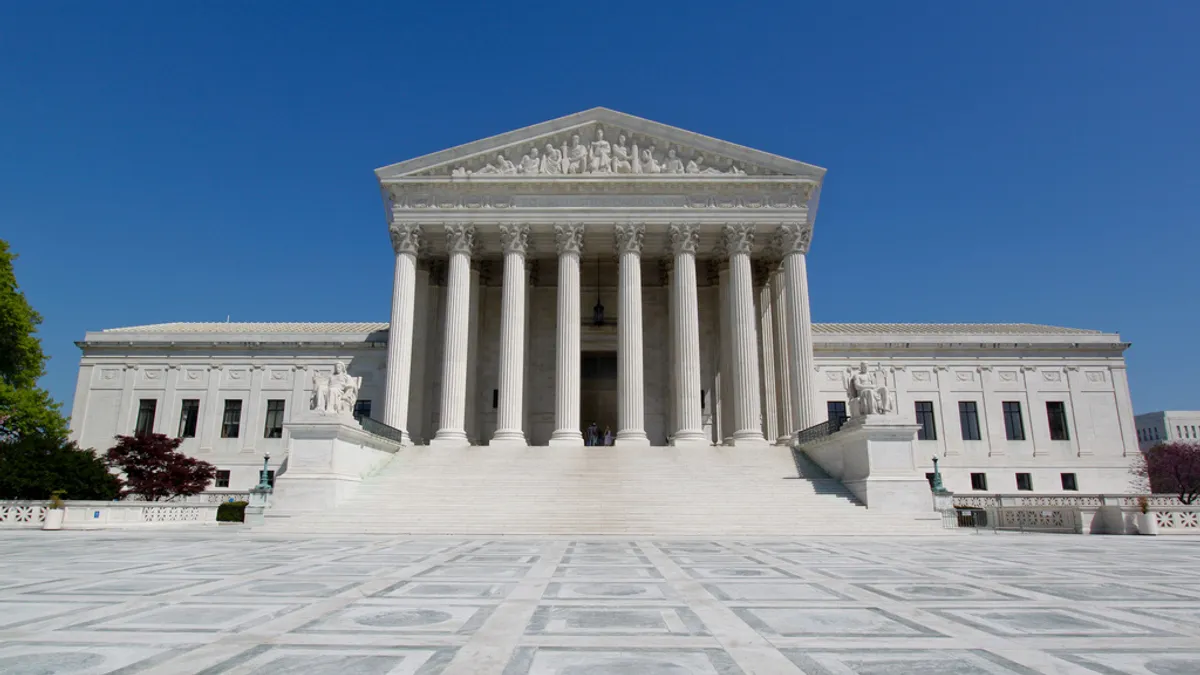Dive Brief:
- The Supreme Court will hear oral arguments Wednesday in a consolidated case examining state incentives to construct new power plants, and whether those incentives would distort federal power markets under the jurisdiction of the Federal Energy Regulatory Committee.
- This is the third high profile energy case the court has heard in recent years which deals with state-federal jurisdictional issues, Greenwire reports, but the death of conservative Justice Antonin Scalia has made it difficult to predict which way the court will lean.
- In 2015 the high court determined state lawsuits against energy companies were not preempted by FERC's authority, and earlier this year the judges sided with federal regulators over demand response participation in wholesale markets.
Dive Insight:
Supreme Court decisions involving the utility sector world are relatively rare, which has made the last year so unusual and important. The court will hear arguments today in the consolidated cases of Hughes v. Talen Energy Marketing and CPV Maryland LLC v. Talen Energy Marketing. Greenwire reports the trio of decisions will help clarify the limits limits of FERC's jurisdiction.
"I think we will look back on these series of decisions decades from now as foundational and landmark decisions that allocate responsibility for governing the grid in a very different way than the bright line split of the Federal Power Act would seem to imply," University of Richmond law professor Joel Eisen told Greenwire.
Despite Scalia's death, Eisen also predicted the court would still coalesce around a majority finding, and it would likely favor states' ability to incentivize power plant construction. Denying states that ability would "appear to give FERC complete authority over the wholesale markets," something he said was inconsistent with the demand response decision.
Four years ago, Maryland regulators
called for the construction of a 725 MW gas-fired facility in
Charles County, and directed Baltimore Gas and Electric Co. to purchase the output for two decades. That made the plant economically viable, allowing the state to avoid power shortages. But large generators in the regional sued, saying the plan unfairly disadvantages them.
Two lower courts previously tossed out the programs, saying that providing incentives for generation that would compete in regional markets violated FERC's sole authority to regulate interstate wholesale markets.
Maryland and a group of generators appealed to the Supreme Court, arguing that the programs do not directly set wholesale prices, but instead simply provide financial arrangements to facilitate new generation construction. Both states initiated their programs due to concerns that the PJM market structure is too focused on the short term to provide reliability and low rates years into the future.
Similar to the FERC Order 745 case, the Maryland case will hinge on whether action in one market constitutes regulation of another.
"What's at stake here is how much autonomy does a state or ... a locally controlled utility have to determine what our resource mix should be, what kind of generation we should have," said American Public Power Association President and CEO Sue Kelly. "We should be able to make those decisions."















